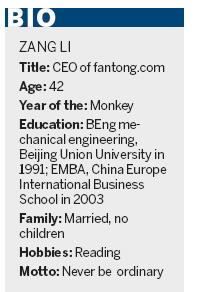
Zang Li shows a map of China with every region marked where his company has a presence. PAN DONGGANG / FOR CHINA DAILY
Zang savors the flavor of his third career
Before Zang Li set up the successful website fantong.com, he worked as a mechanic and an extremely successful financial broker.
"I have worked in three totally different fields so far - mechanical engineering, finance and Internet," Zang told METRO in his office near Beijing's West Third Ring Road.
After graduating from Beijing Union University in 1991, Zang worked in Beijing Automobile Group to introduce overseas technology.
His first career change happened one year later. Zang quit his job and went to Hainan province to be a futures broker.
"I felt hurt in Beijing Automobile. I fulfilled my tasks but still had no chance to receive overseas training opportunities, as I had no guanxi. Some people went, not because they were better than me, but because they had better relationships with high level officials."
The Beijing-born Zang said that he wanted to make a living away from home, so he chose the southern part of China, an emerging market that attracted many young Chinese in the early 1990s.
He applied for many jobs but was turned down because of his lack of relevant experience.
"But a securities company hired me, since nobody else possessed financial experience. This was a totally new industry in China. Whoever learns quickly wins."
Zang became among one of the first people to conduct brokerage in China. He said it was difficult to find enough professional books in the Chinese mainland, so he had friends bring some from Hong Kong or bought copies of originals.
"They cost me an arm and a leg. For one book, it might be over 100 yuan," Zang said.
But he said it was worth it as while people in State-owned enterprises were earning 160 yuan per month, or if they worked in a foreign company maybe 600 yuan per month; he was already earning 20,000 yuan every month in 1993.
"When few people could afford a round trip by plane to Hainan, my wife and I did it during our honeymoon," Zang said.
Zang returned to Beijing after he married in 1993, working in securities, until he accepted a job with China International Television Corporation, a subsidiary of China Central Television.
However, in 2003, he surprised people by quitting his job as deputy director of the assets management division of CITC. "I did not regret leaving. I worked in CITC for more than seven years. It was too long. I only regret that I quit too late."
It was the EMBA course in China Europe International Business School that changed Zang's career path.
"The first day I came to the EMBA classroom, I found although my classmates and I were probably around the same age, most of them were CEOs of private companies or high level executives of State-owned enterprises."
Zang recalled that because his classmates had more achievements than him, he felt uncomfortable in class. However, they also gave him the motivation to start a business.

"There is a Chinese proverb: though one may not taste pork, he (she) sees the pig running. I observed and learnt about what it was like to operate a self-owned company. I felt it was my turn to taste some pork."
The idea of establishing fantong.com was generated in 2003 during SARS. Zang planned a gathering of EMBA classmates in Beijing, but he found most of the restaurants were closed and he couldn't find a suitable place to host 100 people.
"I thought it was an opportunity, to set up a website telling people what restaurants they should go to. We can post detailed information about restaurants, such as its specialty, address, and rankings. Of course, we can also offer coupons."
Zang and three friends invested 1 million yuan to start the website at the end of 2003. They called it fantong to mean unifying meals from various restaurants, though fantong in Chinese also sounds like the phrase "an idiot does nothing but eat".
"It's easy for people to remember," he laughed.
In 2008, fantong.com received $4 million from four Japanese investors and Zang said the website was already making money and realized an average growth rate of 100 percent per year.
"Last year, around 50 percent of our revenue came from advertisements. When people make orders through fantong and go to restaurants, we receive cash back from those restaurants and that accounts for 30 percent. The remainder is membership fees."
In the future, Zang said his goal is to make fantong.com a NASDAQ-listed company.
"I am too familiar with the magic of the capital market. As a broker, you may earn double money per year, but for public offerings of a stock, you increase your fortune by dozens."





